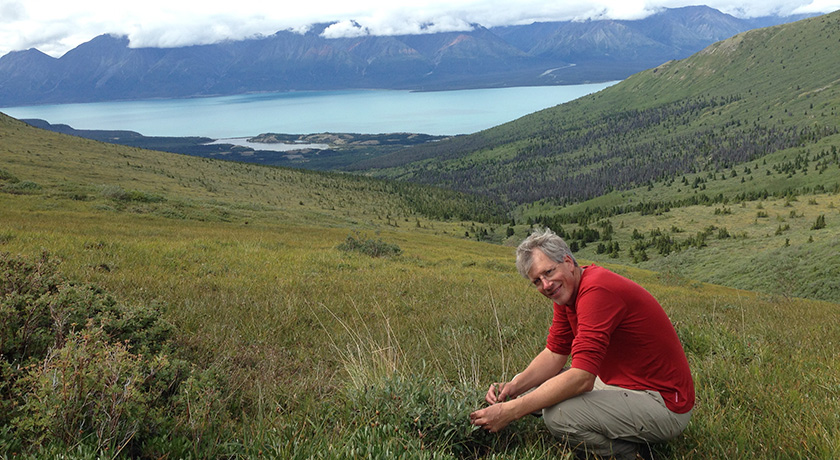
David Hik has been working for decades to improve our understanding of Canada's North.
When we think about Canada, David Hik explains, most of us don't see the whole picture.
"A common perception of Canada is weighted-it is very bottom-heavy," explains Hik, professor with the Department of Biological Sciences. "But our place in the world is anchored in the North. We have to take that seriously."
With an estimated 75 percent of Canadians living within 175 kilometres of the American border, the weight of demography and the numerous challenges faced by urbanized centres cause people to lose sight of a huge part of Canada's physical and cultural diversity-the vast Canadian north.
"Thinking about where Canadians live on our planet and the responsibilities we have as the second largest country, the people, communities and environments in the Canadian north need more attention," explains Hik, expert in arctic and alpine ecology. "I think it is important to work together to move Canada's centre of gravity farther north.
One way to improve understanding and raise awareness of northern issues is through research.
"As we research and communicate our understanding of Canada's north, and the changes that are occurring across this region, we become more balanced and centred as a country," says Hik.
Fieldwork in the north is highly collaborative-both across subject areas and among communities with different perspectives and expertise. Involving the wider community in northern research is critical, as well as building capacity and integrating local and indigenous knowledge, so that northerners are able to lead and conduct their own research.
"Community partners generate many of the new ideas, and we can provide the support and assistance and expertise to get things running. And eventually these collaborations may become entirely community-driven," explains Hik.
Award-winning work
Hik's contributions to northern research and awareness have not gone unnoticed.
In December 2016, Governor General David Johnston awarded Hik the Canadian Polar Medal. This honour celebrates Canada's northern heritage and recognizes an individual for contributions to the exploration, knowledge, and sovereignty of the Canadian north.
"I am honoured and I hope that I've made some small contribution," Hik says. "Issues in the north need more attention, and we have to keep pushing and pushing and pushing to move our focus northward and shift Canada's centre of gravity."
Research can move mountains
Hik is also a lead contributor of the Canadian Mountain Network.
Established in 2016, the Network is an alliance of academic, government, indigenous, private, and community partners dedicated to the sustainability of mountain cultures and environments across Canada and around the world. The Network is hosting the first annual Mountain Festival from Friday, December 9 to Thursday, December 16.
"People have many, many questions about mountains. What is its name? Who climbed it first? What peoples lived here? What type of tree is that? What wildlife lives there? Why are the clouds blowing this way? How is the climate changing? We are intensely curious about mountain environments. Mountains are impossible to ignore-and Canada has some of the most amazing mountains in the world."
In conjunction with Zac Robinson, assistant professor in the Faculty of Physical Education and Recreation, Hik is also leading Mountains 101, the University's newest massive open online course. Open to anyone, anywhere and free of charge, Mountains 101 features contributions from environmental historians to glaciologists to Parks Canada scientists, and more.
"Cultivating awareness and spreading knowledge is very important-and Mountains 101 helps to do just that," explains Hik.